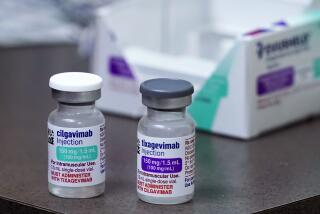FDA Balks at Ribavirin Test as Drug for AIDS
- Share via
For the second time in five months, the U.S. Food and Drug Administration has refused to authorize additional testing of ribavirin as a potential early stage AIDS treatment, ICN Pharmaceuticals Inc., the maker of the controversial drug, confirmed Thursday.
An FDA spokesman said the Costa Mesa company, which has been trying since last year to win approval of the drug as an AIDS treatment, still had not demonstrated that ribavirin “meets the agency’s safety and efficacy standards.”
The FDA’s latest decision leaves ribavirin on “clinical hold,” a regulatory limbo that permits no additional clinical experimentation with the drug.
But the drug, which has developed a strong following in homosexual communities throughout California, remains readily available in Mexico as an unofficial and unapproved immune-boosting agent.
The FDA’s decision is considered a significant blow to the drug because it comes only months after the agency promised to liberalize its lengthy and arduous approval process to expedite the development of treatments for such diseases as acquired immune deficiency syndrome. Homosexual lobbying groups had specifically targeted ribavirin as one of the drugs they had hoped would be approved for further testing under the new FDA guidelines.
However, ICN Pharmaceuticals said it remains hopeful that ribavirin may benefit from a bill introduced this week in Sacramento that would permit the state to begin its own evaluations of promising AIDS treatments. Company officials have pledged to cooperate with any state testing program and have agreed to make ribavirin available to researchers.
In April, when the FDA rejected the company’s first request to expand human testing of the anti-viral drug on early stage AIDS patients, it challenged the company’s testing procedures and raised the issue of the drug’s possible toxicity to patients with more advanced forms of AIDS.
AIDS, destroys the body’s immune system, leaving it powerless against certain cancers and otherwise rare infections. It is commonly transmitted through anal and vaginal sexual intercourse, through the sharing of unsterilized hypodermic needles and by mother to fetus during pregnancy.
More to Read
Sign up for Essential California
The most important California stories and recommendations in your inbox every morning.
You may occasionally receive promotional content from the Los Angeles Times.













